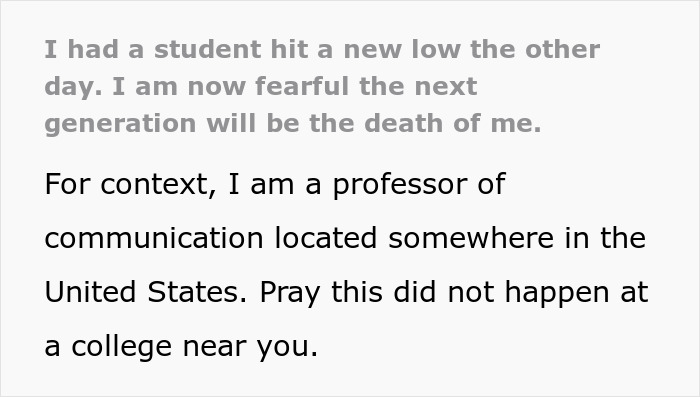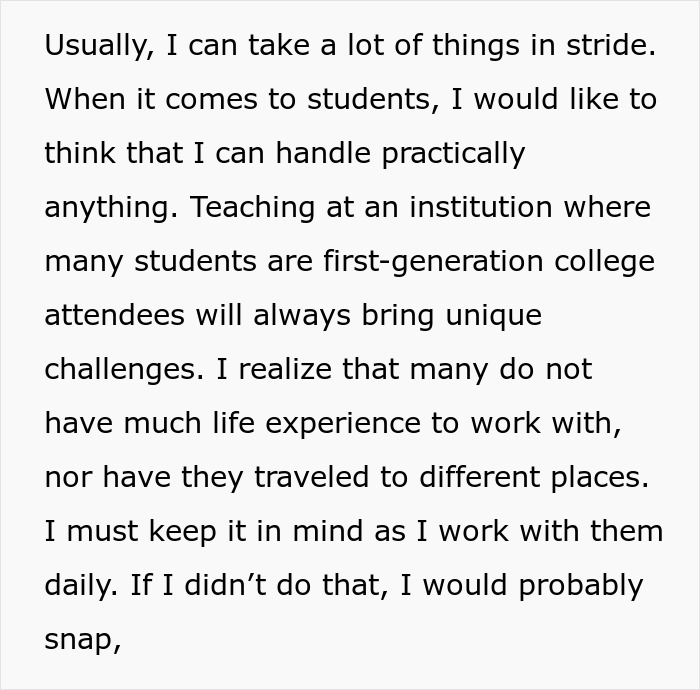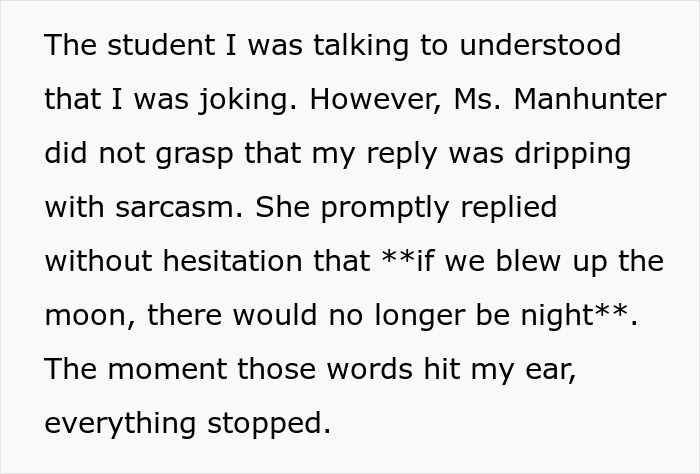We all have our moments. But professor and Reddit user Brian-Latimer has just heard what they believe was the dumbest comment to ever reach their ears. So they turned to the internet to share their bewilderment.
Granted, in their post r/mildlyinfuriating, the professor does mention that it was a course on communications and the remark was about the object in the sky — the moon — so the student who made it clearly isn’t an astronomy expert.
But it’s still quite something.
This professor thought they had seen it all
Image credits: edufigueres (not the actual image)
But they were absolutely dumbfounded by a comment their new student made
Image credits: BOOM (not the actual image)
Image credits: drazenphoto (not the actual image)
Image credits: Brian-Latimer
Some say that recent generations of Americans are, indeed, getting less intelligent, but more research is needed
We got in touch with Brian-Latimer and they said the story is actually an excerpt from a recently self-published book about their experiences as a college professor. “It is full of stories like this and other scary interactions,” the Redditor told Bored Panda. “This story and all of its elements are real, except that it did not happen recently. It was a couple of years ago, but it still resonates with me because everybody has those moments in their career when something happens that will stick with you even on your deathbed.”
The fact that this incident has left such a deep mark on the professor’s memory is quite telling, considering their extensive experience. “I have taught at the college level for over a decade at community colleges, liberal arts colleges, and major universities. I stumbled upon communication because I used to film my friends skating and create skate videos (pre-YouTube),” the professor recalled. “I wanted to get a degree in something I was already doing and didn’t want to work too hard while I was in college.”
“I enjoy teaching students in whatever courses I cover. The best part is seeing something ‘click’ in their heads, and it all makes sense to them,” they said. “Students may do or say something that makes your head hurt, but I don’t fault them for their actions unless they are unwilling to learn. I try to have the patience of Job with students because I can still remember when I was in their position. I was a first-generation student myself and wasn’t too confident when I first got to campus.”
When it comes to Ms. Manhunter, overall, she was doing fine. “She engaged in class, which is always nice, but she often said head-scratching things. The MRS comment she made was during her introduction to the class. Looking back, I give her props for her blunt honesty; at least she knew what she wanted,” the professor said. “In another speech, she said Tim Tebow is the greatest quarterback ever and will lead the Denver Broncos to the Super Bowl. I think he had just won a playoff game then and was at the height of his popularity. I understand everybody has their favorite players; we see them through rose-tinted glasses. Sometimes, we should clean those things better.”
But the Moon comment really floored them. “She was insistent that she was right, and it took a couple of her peers to convince her otherwise,” the professor reiterated. “This can even make the story seem unbelievable. Unless she is the greatest troll or has top-notch acting skills, I am certain she truly believed that was how the Moon worked. Believe it or not, she survived the class. I do not know what became of her, but I hope she is happy wherever she is.”
But the question of whether Americans are becoming less smart is an incredibly nuanced one and very difficult to answer.
However, some research in parts of Europe and the United States has started to see a plateau in intelligence scores.
For example, a recent study in the U.S. found that the country’s college graduates in the 2010s had lower vocabulary scores than their counterparts in the 1970s.
Furthermore, a new study has found evidence of a reverse Flynn effect (the consistent upward drift in IQ test scores across generations) in a large U.S. sample between 2006 and 2018 in every category except one. For the reverse Flynn effect, there were consistent negative slopes for three out of the four cognitive domains.
Ability scores of verbal reasoning (logic, vocabulary), matrix reasoning (visual problem solving, analogies), and letter and number series (computational/mathematical) dropped during the study period, but scores of 3D rotation (spatial reasoning) increased, the study from Northwestern University discovered.
Composite ability scores (single scores derived from multiple pieces of information) were also lower for newer samples.
Despite the results, corresponding study author Elizabeth Dworak doesn’t want people to read these findings and think that Americans are getting dumber.
“It doesn’t mean their mental ability is lower or higher; it’s just a difference in scores that are favoring older or newer samples,” said Dworak, a research assistant professor of medical social sciences at Northwestern University Feinberg School of Medicine. “It could just be that they’re getting worse at taking tests or specifically worse at taking these kinds of tests.”
While the study didn’t examine the reason for the decline in IQ scores, Dworak is aware of the fact that there is no shortage of theories in the scientific community, including poor nutrition, worsening health, media exposures and changes to education.
“There’s debate about what’s causing it, but not every domain is going down; one of them is going up,” Dworak added. “If all the scores were going in the same direction, you could make a nice little narrative about it, but that’s not the case. We need to do more to dig into it.”
The thing that worries Brian-Latimer the most is the way many people perceive students’ level of engagement. “I hear the term thrown around at every faculty meeting I attend. My colleagues constantly complain that these students are not interested in learning. I can’t say this about every student, but I know that is patently false. Students want to learn, that is why they come to class in the first place. At a minimum, they want to earn a passing grade.”
“I think the bigger issue is how the information is presented to them,” they said. “As faculty, we must understand that reading textbooks and writing notes down are not the most fashionable things students want to do nowadays. Besides, having a smartphone in their hands offers them so much more than anything we can provide them. So, we must adjust our teaching methods to divert their attention from their phones. I am not suggesting abandoning all pedagogy and acting like a social influencer, but it requires us, as educators, to pick up our game a little bit.”
Personally, Brian-Latimer does that through sarcasm, honesty, and “a bad stand-up comedy routine.”
The funny thing is, “It seems to work because a number of my students appear to like me, and they tell me that I treat them like adults. That makes me feel good, but it also scares me because it tells me that other professors on campus denigrate them in class. Sure, I may think a student is out of their mind when they say things that would give any rational person pause, but I could never insult a student for not knowing something. Every student has a skill set; our job is to figure out what that is and to help them develop it.”
Finally, to address a type of comment they saw repeatedly under the post, “this is how all professors of communication talk and write. We love to stress clarity and conciseness, but we suck at it.
“If you thought my story was boring and drawn out, just imagine an entire academic conference with hundreds of us in the same place. It’s a lot of talking without anything being said by a bunch of people with the personality of drywall,” Brian-Latimer said.
So will the next generation be the death of them? Maybe. Or maybe not!

























